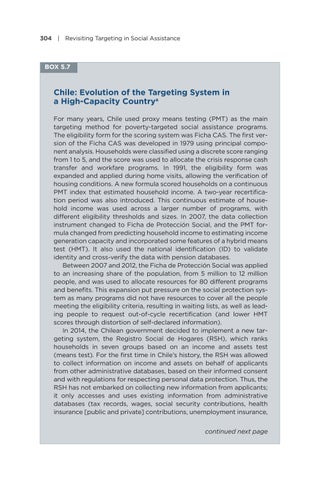304 | Revisiting Targeting in Social Assistance
BOX 5.7
Chile: Evolution of the Targeting System in a High-Capacity Countrya For many years, Chile used proxy means testing (PMT) as the main targeting method for poverty-targeted social assistance programs. The eligibility form for the scoring system was Ficha CAS. The first version of the Ficha CAS was developed in 1979 using principal component analysis. Households were classified using a discrete score ranging from 1 to 5, and the score was used to allocate the crisis response cash transfer and workfare programs. In 1991, the eligibility form was expanded and applied during home visits, allowing the verification of housing conditions. A new formula scored households on a continuous PMT index that estimated household income. A two-year recertification period was also introduced. This continuous estimate of household income was used across a larger number of programs, with different eligibility thresholds and sizes. In 2007, the data collection instrument changed to Ficha de Protección Social, and the PMT formula changed from predicting household income to estimating income generation capacity and incorporated some features of a hybrid means test (HMT). It also used the national identification (ID) to validate identity and cross-verify the data with pension databases. Between 2007 and 2012, the Ficha de Protección Social was applied to an increasing share of the population, from 5 million to 12 million people, and was used to allocate resources for 80 different programs and benefits. This expansion put pressure on the social protection system as many programs did not have resources to cover all the people meeting the eligibility criteria, resulting in waiting lists, as well as leading people to request out-of-cycle recertification (and lower HMT scores through distortion of self-declared information). In 2014, the Chilean government decided to implement a new targeting system, the Registro Social de Hogares (RSH), which ranks households in seven groups based on an income and assets test (means test). For the first time in Chile’s history, the RSH was allowed to collect information on income and assets on behalf of applicants from other administrative databases, based on their informed consent and with regulations for respecting personal data protection. Thus, the RSH has not embarked on collecting new information from applicants; it only accesses and uses existing information from administrative databases (tax records, wages, social security contributions, health insurance [public and private] contributions, unemployment insurance, continued next page


